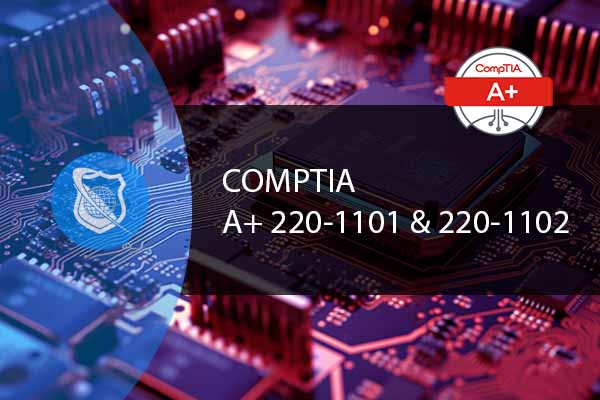What is Linear Programming?
Definition: Linear ProgrammingLinear Programming (LP) is a mathematical method for determining a way to achieve the best outcome in a given mathematical model. Its functions are represented in linear relationships.

Today, we are going to delved into understanding the CompTIA A+ certification, a well-regarded credential in the field of IT and computer technology. The CompTIA A+ certification is an entry-level certification designed to validate foundational skills and knowledge required for a career in IT support and technical roles.
The CompTIA A+ certification stands as a foundational milestone in the realm of information technology. Created and administered by the Computing Technology Industry Association (CompTIA), this certification serves as a testament to an individual’s proficiency in fundamental IT skills and knowledge. With a focus on hardware, software, troubleshooting, and operational procedures, the CompTIA A+ certification is the entryway for those embarking on a journey in IT support and technical roles. As we delve into the intricacies of this certification, we uncover its significance, relevance, and impact on the ever-evolving landscape of technology-driven careers.
The entity behind the CompTIA A+ certification is the Computing Technology Industry Association, commonly known as CompTIA. As a respected nonprofit trade association within the IT industry, CompTIA holds a prominent role in setting industry standards, fostering innovation, and advancing technological expertise. With a commitment to enhancing the capabilities of IT professionals, CompTIA designs and administers the A+ certification program. This program serves as a recognized benchmark for individuals entering the field of IT, validating their essential skills and knowledge and equipping them for success in a range of technical roles. Through its reputable authority, CompTIA provides a pathway for aspiring IT professionals to demonstrate their competence and gain industry recognition in a competitive and dynamic environment.
Get an exceptional price on training and preparation for both the 220-1101 and 220-1102 courses. Designed to ensure you are fully prepared to take and pass the A+ exam.
The CompTIA A+ certification is tailored for individuals who are at the threshold of their IT careers and seek to establish a solid foundation in essential technical skills. This certification is ideally suited for:
The CompTIA A+ certification equips these individuals with the necessary skills to embark on careers in IT support, technical troubleshooting, and customer service roles, providing a stepping stone for further professional growth and specialization within the IT field.
The CompTIA A+ certification consists of two separate exams, Core 1 (220-1001) and Core 2 (220-1002), each covering distinct areas of IT knowledge and skills. These exams are designed to assess a candidate’s proficiency in a wide range of topics related to hardware, software, networking, security, and troubleshooting. Here are the key details about the exam requirements:
Successfully passing both the Core 1 and Core 2 exams demonstrates a candidate’s comprehensive knowledge of essential IT concepts and their ability to handle various technical challenges. This accomplishment not only validates an individual’s skills but also opens doors to numerous IT support and technician roles in the industry.
Benefits of CompTIA A+ Certification
Earning the CompTIA A+ certification offers a range of advantages for individuals pursuing a career in the field of information technology. This certification validates essential technical skills and knowledge, making certified professionals stand out in the competitive job market. Here are the key benefits of obtaining the CompTIA A+ certification:
In essence, the CompTIA A+ certification acts as a doorway to the IT industry, offering a range of benefits that contribute to professional growth, increased opportunities, and enhanced credibility in the world of technology.

Take advantage of our Free 7 Day Trial to our exclusive A+ training. No obligation and no credit card required.
Preparing for the CompTIA A+ certification requires a combination of study, practice, hands-on experience, and familiarity with the exam objectives. Here’s a comprehensive guide to help you effectively prepare for the certification:
Remember that preparation is a gradual process. Consistency, dedication, and a well-structured approach will greatly enhance your chances of success in obtaining the CompTIA A+ certification.
the cost of each exam for the CompTIA A+ Certification may vary based on factors such as location and currency. However, I can provide you with a general estimate of the exam costs as of that time:
Please note that these costs are approximate and can vary. Additionally, CompTIA often offers bundle deals or packages that provide a discount when you purchase both exams together. It’s advisable to visit the official CompTIA website or authorized testing centers for the most up-to-date and accurate information regarding exam costs, potential discounts, and any changes that might have occurred since my last update.
Keep in mind that certification costs can change over time, so it’s a good idea to verify the current exam fees before making any arrangements.
Obtaining a CompTIA A+ certification can open the door to various entry-level IT positions, especially in the realm of IT support and technical roles. While salaries can vary based on factors like location, company size, and job responsibilities, here are some potential job roles along with estimated salary ranges for individuals holding a CompTIA A+ certification:
Keep in mind that salary ranges can vary significantly based on factors like geographic location, cost of living, industry sector, company size, and your level of experience. As you gain more experience and potentially pursue further certifications or education, your earning potential in the IT industry can continue to grow.
In conclusion, the CompTIA A+ certification serves as an excellent starting point for individuals seeking a career in IT support and technical roles. With its comprehensive coverage of foundational IT skills, recognition in the industry, and potential for career growth, it’s clear that the CompTIA A+ certification holds significant value for aspiring IT professionals. As I continue to explore the world of IT certifications, I’m excited to see how this credential contributes to the professional development of many in the field.
Yes, each of the Core 1 and Core 2 exams has a maximum duration of 90 minutes. It’s important to manage your time effectively to ensure you have enough time to answer all the questions.
CompTIA offers online testing options for its exams, including the CompTIA A+ certification. You can check with CompTIA or authorized testing centers for specific details about online testing availability and requirements.
The CompTIA A+ certification is valid for three years from the date of certification. To maintain your certification, you need to earn continuing education units (CEUs) or pass the latest version of the A+ exam before the certification expires.
While it’s possible to pursue more advanced certifications without obtaining the CompTIA A+ certification, the A+ certification provides a strong foundation of knowledge and skills that can be beneficial for your career progression, especially if you’re new to the IT field.
Joining the CompTIA A+ certified community gives you access to a network of professionals who have earned the same certification. This community can provide valuable insights, resources, and support, allowing you to connect with others in similar roles and learn from their experiences.
Lorem ipsum dolor sit amet, consectetur adipiscing elit. Ut elit tellus, luctus nec ullamcorper mattis, pulvinar dapibus leo.
$49.99 Original price was: $49.99.$16.99Current price is: $16.99. / month with a 10-day free trial
Definition: Linear ProgrammingLinear Programming (LP) is a mathematical method for determining a way to achieve the best outcome in a given mathematical model. Its functions are represented in linear relationships.
Definition: Quality of Experience (QoE)Quality of Experience (QoE) refers to the overall level of satisfaction or dissatisfaction a user feels when using a particular product, service, or application. It encompasses
Definition: Network DiameterNetwork diameter is a critical metric in network topology that represents the longest shortest path between any two nodes in a network. This measurement is vital for understanding
Definition: Time-to-Live (TTL)Time-to-Live (TTL) is a mechanism used in networking and computing to limit the lifespan of data in a network. It specifies the duration or number of hops that
Definition: Buffer CacheBuffer cache is a memory management technique used by operating systems to improve the performance of disk I/O (Input/Output) operations. It acts as an intermediary, temporarily holding data
Definition: Dynamic ProgrammingDynamic programming is a method used in computer science and mathematics to solve complex problems by breaking them down into simpler subproblems. It is particularly useful for optimization
Definition: FTP Anonymous AccessFTP Anonymous Access refers to a method of accessing files on an FTP (File Transfer Protocol) server without needing a specific user account or password. This type
Definition: Full-Disk Encryption (FDE)Full-Disk Encryption (FDE) is a security measure that encrypts all data on a disk drive, protecting the information stored on the device from unauthorized access. This process
Definition: URL EncodingURL Encoding, also known as percent-encoding, is a method used to encode information in a Uniform Resource Locator (URL) to ensure that it is transmitted correctly over the
Definition: Event-Based IntegrationEvent-based integration is a method of connecting different software systems or applications by using events as the triggering mechanism for data exchange and process synchronization. This approach allows
Definition: Fixed Wireless Access (FWA)Fixed Wireless Access (FWA) refers to a type of high-speed internet connection that uses wireless technology to deliver broadband services to fixed locations such as homes
Definition: Mutation TestingMutation testing is a software testing technique where the software is modified or “mutated” in small ways to create aWhat Is Mutation Testing?Definition: Mutation TestingMutation testing is a
ENDING THIS WEEKEND: Train for LIFE at our lowest price. Buy once and never have to pay for IT Training Again.

Get ready for the updated 220-1201 & 220-1202 exams with our brand-new CompTIA A+ training—designed to help you pass with confidence and start your IT career strong. Access this course and over 2,900 hours of expert-led IT training when you sign up for any of our All-Access Passes. Don’t miss out—enroll now and start learning today!